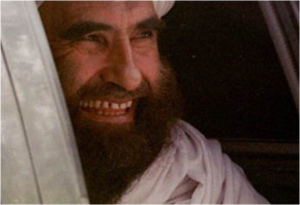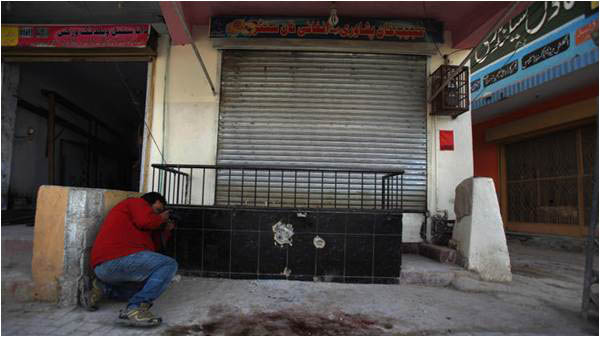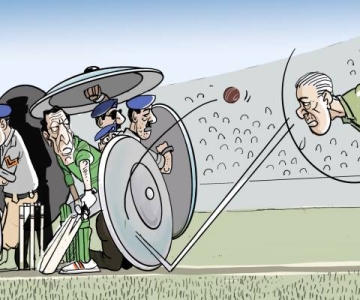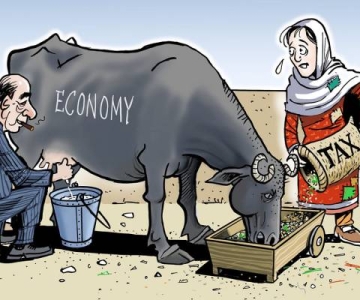A photographer takes picture of the spot where Nasiruddin Haqqani, a senior leader of the feared militant Haqqani network, was assassinated at an Afghan bakery in the Bhara Kahu area on the outskirts of Islamabad. Anjum Naveed/AP
By Raza Rumi
Nasiruddin Haqqani’s assassination is a significant move in a game of chess and nerves
Pakistan’s media had to turn its attention to the visible-invisible world of good Taliban when the news of a high profile assassination hit social media. A key member of the controversial Haqqani network was assassinated in a quiet corner of Pakistan’s capital. The slain Nasiruddin was the brother of Siraj Uddin Haqqani and a son of Jalaluddin, a key figure of the Afghan jihad against the Soviets in the 1980s. Haqqani group or better known as a network is reportedly close to Pakistan’s security establishment. Pakistan’s alleged patronage and protection to Haqqanis has been one of the major causes for trust deficit between Pakistan, US and Afghan authorities. It may have jeopardized counterterrorism efforts over the last decade.
“He was the financier and emissary of the Haqqani network”
Nasiruddin Haqqani was known as the financier and emissary of the Haqqani network and unlike his brother and his father, kept a low profile. News stories circulating in the mainstream media consider his death to be perpetrated by unknown assailants. The aims can inevitably be linked to demoralizing or undermining the network, which has been at the core of Pakistan’s security policy vis-a-vis Afghanistan. In the aftermath of HakeemUllah Mehsud’s death in a US drone strike in the village of Dande Darpa Khel of North Waziristan the Afghan Taliban’s overt support to the Pakistani Taliban or the Tehreek e Taliban I Pakistan (TTP) emerged as a clear signal of how the two branches of the same ideology reinforce each other. Haqqani network, according to several reports, though separate was not too averse to TTP either.

The Haqqani network is a semi-autonomous component of the Taliban an umbrella organization of various splinter groups, subscribing to the imposition of Sharia Law in both Afghanistan and Pakistan. According to a report published in 2012 by Council for Foreign Relations, Combating Terrorism Center: Haqqani Network Financing: The Evolution of an Industry, the Haqqani network during the last thirty years has grown into a major business empire and its portfolio mirrors a Mafia underlining the role of an illicit business side that focuses on enriching the group and expanding its operations. Its funds reportedly are raised from ideologically driven donors not necessarily allies in their mission. Funds raised from Oil rich states in the Gulf, particularly the Kingdom of Saudi Arabia since the 1980s and the fact that over the past three decades they have penetrated key business sectors in financial centers such as Karachi, Lahore and Dubai, makes them a potent force to be reckoned with. They are heavily involved in export-import operations, transport and real estate and construction businesses. Their involvement in narcotics and raw chemicals has also been reported although to a lesser degree than their Taliban counterparts in Afghanistan. The broad range of their corporate activities in which the Haqqani’s engage suggest that they are financially motivated and hoarding of wealth is as important as securing ideological goals.
Others deny these charges and Pakistan has officially stated its distance from the network but the presence of a key member in the Capital territory once again raises questions and has been a source of some embarrassment for us.
“During the peace talks in Doha initiated by the United States, Nasiruddin Haqqani represented his network”
It is said that Nasiruddin played a mediating role in ensuring that Middle Eastern influence in Pakistan. He was irksome to the US as well. During the peace talks in Doha initiated by the United States, Nasiruddin Haqqani represented his network in efforts to set up a Taliban office in the capital of Qatar for resolving disputes between his allies and the United States. Reportedly, he was also the group’s main go to man for liaising between pro-Taliban elements and his network and allies in Pakistan of which some of them were right wing political parties such as JUI (F).
His assassination therefore is a significant event in the game of chess and nerves being played out between Pakistan’s establishment, the various Taliban networks and the intelligence agencies of USA and Afghanistan. Nasiruddin’s decision to base himself in Islamabad and ensuring that his network’s operations were safe may explain his assailants motives. A former military official, on the condition of anonymity said that this assassination was another attempt by Afghan and American officials to decapitate Pakistan’s assets in the Afghan game. The source added that with Fazlullah’s ascension as the chief of TTP and undermining of Haqqani network, pressure on Pakistan could mount in the days to come. How far is this claim true is anybody’s guess and until more information comes to public light it would be difficult to state as to how this happened.
Another theory circulating in Islamabad is that the annoyance of Pakistan’s security establishment with TTP and its direct assault on a senior General in the recent days may have led to some distancing from the network. The proponents of this view cite the statement by TTP in which it has blamed the Pakistan’s premier intelligence agency ISI for this murder. In the land of conspiracy theories, all such versions are speculative constituting segments of truth, which seldom is recognizable.
It is unclear that how will the Haqqani network respond to this event. The network, which has evolved into a transnational Jihadist financial juggernaut, needs mediators and reliable intermediaries between various financial and ideological interests. Figures such as Nasiruddin were crucial to the Haqqani’s business empire. Engaging in violent conflict can become a financial incentive to raise funds and also pursue an ideological agenda that can become auto-financed. Afg-Pak war economy is a much ignored dimension of the conflict that has engulfed this region. The actors that benefit from it have a vested interest to prolong this conflict. In Haqqani’s murder the conflict may have been further accentuated. A dreaded US enemy has been neutralised, to use the infamous Americanism of our times. Pakistan’s patronage to the network has also been exposed; and the TTP may have lost an unreliable ally. In the days to come, a clearer picture will emerge.
Raza Rumi is a writer, policy analyst and an editor at TFT. www.razarumi.com
– See more at: http://www.thefridaytimes.com/tft/murder-in-the-capital/#sthash.xZAhEGBI.dpuf



